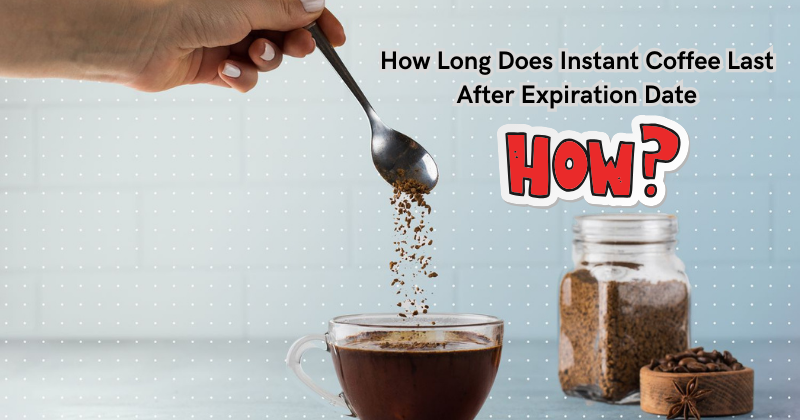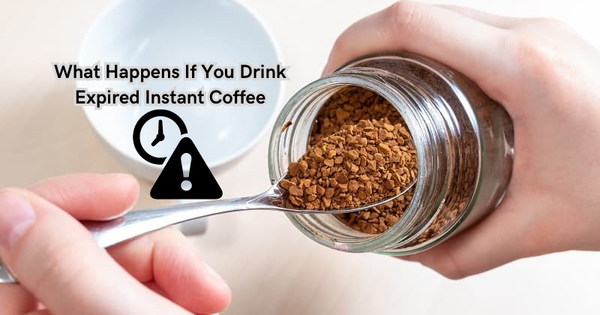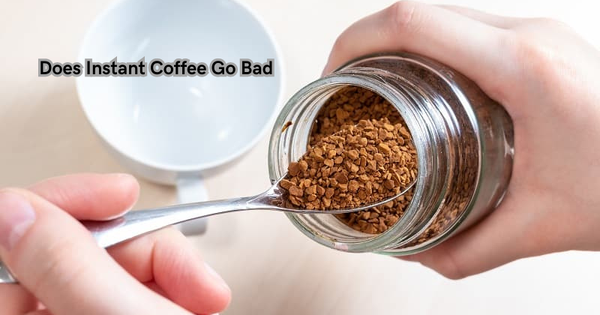Instant coffee is a convenient go-to for many caffeine enthusiasts, but what happens when it surpasses its expiration date?
In this article, we unravel the mystery of how long instant coffee lasts after its expiration date. We'll explore the factors that impact its shelf life, potential changes in flavor and quality, and whether it's safe to consume post-expiration.
Whether you're a coffee aficionado seeking to maximize your pantry staples or a curious consumer with forgotten jars, understanding the longevity of instant coffee is key. Join us as we delve into the science and practicality behind the lifespan of this beloved beverage staple.
What is Instant Coffee?
Instant coffee, also known as soluble coffee or coffee powder, is a go-to for many seeking convenience and quick caffeine fixes. Its creation involves brewing regular roasted coffee beans and then freeze-drying or spray-drying the concentrated liquid to produce water-soluble granules. This process removes most of the moisture content, resulting in a product that dissolves instantly when mixed with hot water.
While it may not provide the same depth of flavor as freshly brewed coffee, instant coffee offers a quick and easy option for those on-the-go or looking to save time. The shelf life of this product can vary depending on several factors. Ground coffee beans, on the other hand, typically have a longer shelf life due to their lower moisture content. Coffee grounds can last up to six months in the pantry, while whole beans can last even longer.
Do Coffee Expire?
Yes, coffee, like most food items, does eventually expire. However, the definition of "expiration" in terms of coffee is a bit more complex than just a date on a label. The expiration date on instant coffee refers to the manufacturer's estimate of when the product will start losing its optimal flavor and quality. It doesn't necessarily mean that it will become dangerous or undrinkable after that date.
Instant coffee has a significantly longer shelf life compared to its freshly brewed counterpart due to the freeze-drying or spray-drying process. This removes most of the moisture content, which is essential for bacterial growth and spoilage. However, various factors can impact the lifespan of instant coffee, such as storage conditions and packaging. Whole bean coffee, for instance, is best when stored in a cool, dry place away from direct sunlight and moisture.
How Long Does Instant Coffee Last After Expiration Date?
The shelf life of instant coffee can vary depending on the aforementioned factors. Typically, if stored correctly, unopened jars or packets of instant coffee can last anywhere from 2-20 years after their expiration date. Once opened, however, it's best to consume the product within 1-2 years for optimal flavor and quality.
Keep in mind that these timeframes are not set in stone and can vary depending on the storage conditions. If exposed to moisture or extreme temperatures, instant coffee can spoil faster and lose its quality sooner. Freshly brewed coffee also has a shorter lifespan, with most experts recommending consumption within 1-2 weeks of roasting.
Factors that Impact the Shelf Life of Instant Coffee
The shelf life of instant coffee can vary based on several factors, including storage conditions, packaging, and type of coffee.
Storage Conditions
Like most food products, the way you store your instant coffee significantly impacts its lifespan. Ideally, it should be stored in a cool, dry place away from direct sunlight. Exposure to heat, air, and moisture can accelerate the breakdown of oils and other compounds in coffee, resulting in changes in flavor and quality. Store instant coffee in airtight containers or resealable bags to minimize its exposure to these elements.
Packaging
The packaging of instant coffee plays a significant role in its shelf life. Airtight containers or packets provide a barrier against moisture and oxygen, extending the product's lifespan. Once opened, ensure that you reseal the container tightly to prevent exposure to air and moisture. Opened instant coffee should put in clean jars with airtight lids for optimal freshness. Unopened instant coffee can also be stored in the freezer, which can prolong its shelf life significantly.
Type of Coffee
Various types of instant coffee can have different shelf lives. For example, freeze-dried instant coffee typically lasts longer than spray-dried due to the difference in moisture content. Additionally, flavored instant coffees may have added ingredients that can impact their longevity.
Before going have you stored properly to make it last longer? If not, you can consider doing that now. Proper storage is key to extending the shelf life of instant coffee and ensuring optimal flavor and quality.
Is It Safe to Consume Instant Coffee After Expiration?
In most cases, instant coffee is still safe to consume after its expiration date. The freeze-drying or spray-drying process removes most of the moisture that bacteria need to grow. This makes the chances of bacterial contamination and foodborne illnesses relatively low compared to other perishable food products.
However, consuming expired instant coffee may result in a less desirable taste and potential changes in flavor due to the breakdown of oils and other compounds over time.
Signs That Your Instant Coffee Has Gone Bad
While expiration dates serve as a guideline for when to consume a product for optimal flavor, you should also rely on your senses to determine if instant coffee has gone bad. Signs that your instant coffee has spoiled include a noticeable change in color, texture, or smell. If any of these changes are present, it's best to discard the product and purchase a fresh batch.
Plus, consuming spoiled food products could potentially lead to digestive problems and other health concerns. It's always better to err on the side of caution when it comes to expired food items.
Tips for Extending the Shelf Life of Instant Coffee
To ensure the longest possible shelf life for your instant coffee, here are some helpful tips:
- Store in an airtight container or packet to prevent exposure to air and moisture.
- Keep in a cool, dry place away from direct sunlight.
- Avoid storing instant coffee in the refrigerator or freezer as this can cause condensation and spoilage.
- Use clean utensils when scooping out instant coffee to prevent contamination.
- Consume opened containers within 1-2 years for optimal flavor and quality.
- Check for any signs of spoilage before consuming.
Do Coffee Beans Go Bad?
Similar to instant coffee, roasted coffee beans do expire. While they may not have a specific expiration date, their quality and flavor can significantly deteriorate over time. The oils in coffee beans can go rancid if stored incorrectly or for too long, resulting in a stale and undesirable taste.
To prevent this from happening, it's essential to store your coffee beans properly in an airtight container, away from heat and sunlight. It's also best to purchase smaller quantities of coffee beans at a time to ensure you're consuming the freshest batch possible.



